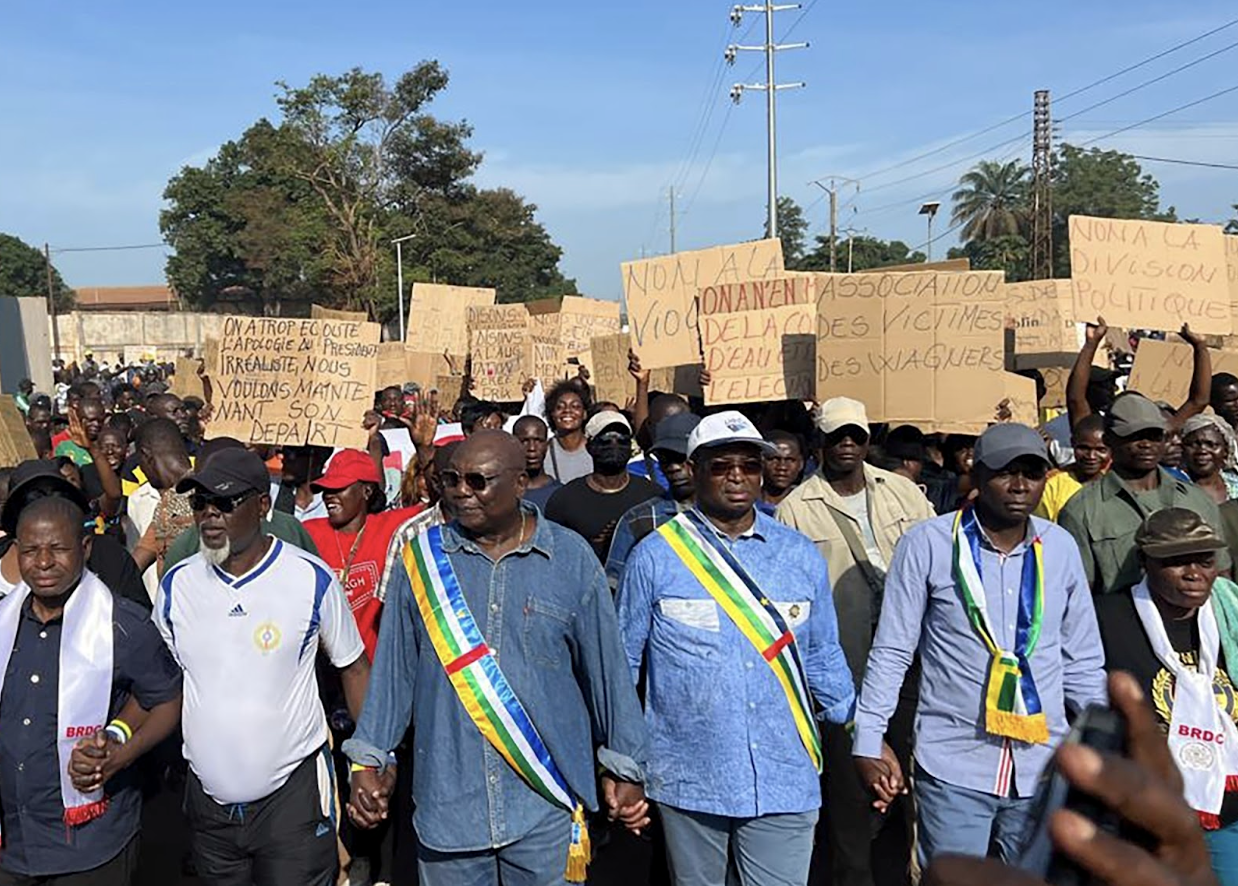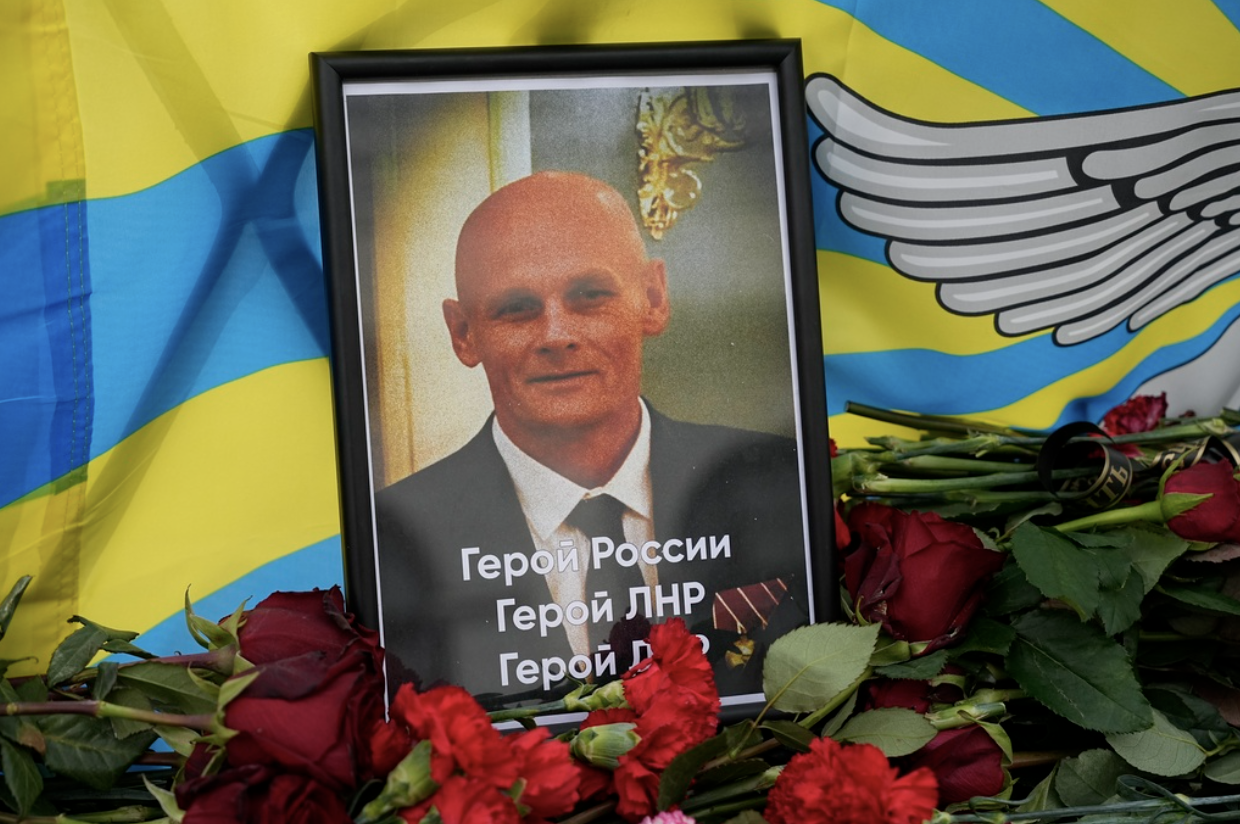Op-ed: Is Russia Really Helping Developing African Nations?
April 4, 2025, Opposition parties in the Central African Republic demonstrate in the streets of Bangui in protest of the government and its usage of Wagner mercenaries. (Photo: AP Photo/Jean Fernand Koena)
As part of its battle for power against the Western world, under Vladimir Putin’s leadership Russia has turned to developing nations to extend his influence. It has developed quasi-state actors, under the umbrella title of Private Military Corporations (PMC), which are used not only to expand the international sphere of Russian dominance, but also to strike deals with these developing, resource-rich countries from which Russia greatly benefits. Notably, Russia has turned to African nations in this strive for dominance.
The Wagner Group serves as a prime example of Russia’s quest for world domination. Founded in 2014 by Yevgeny Prigozhin, the mercenary group conducted global military operations on behalf of the Kremlin somewhat independently up until Prigozhin’s death in 2023. Though originally founded during the initial Russian invasion of Ukraine, the Chechnya region, Wagner notably branched operations out to many African nations. Since then, the Russian government has tightened control over Wagner operations, particularly on the African continent, where Russian fighters are involved in numerous operations throughout the Central African Republic, Mali, Mozambique, and more. Under Prigozhin’s leadership, Wagner built deep political, economic, and military ties on the continent. Since his death, the Kremlin has taken over the mercenary group’s operations.
August 26, 2023, a portrait of Dmitry Utkin, a Wagner Group military official who is presumed to have died in the same plane crash that killed Wagner owner Yevgeny Prigozhin. (Photo: AP Photo/Alexander Zemlianichenko)
In the Central African Republic, Wagner mercenaries appeared as military instructors in 2018. In 2020, they shifted their operations to direct combatants during a rebel offensive, helping to facilitate and secure the 2021 re-election of President Faustin-Archange Touadéra. The relationship between the CAR and Wagner is exactly what Russia strives for in its global PMC operations—in exchange for military support, Touadéra allows Russia control over CAR’s valuable resources such as gold mines, breweries, and media outlets. Wagner has become deeply embedded within the country’s economy and politics, and Wagner personnel regularly receive favors from the regime.
In Mali, Russian PMCs have taken advantage of the nation’s distaste towards France, capitalizing on their frustration. Since the withdrawal of French forces from the nation, Russian operatives have stepped in to fill the security void, supporting Mali’s military junta in battling jihadist groups. Since the beginning of Russian involvement, Mali has become among those most intertwined with Wagner. Previously, Mali’s security against Islamist insurgencies as well as numerous coups came from the UN mission MINUSMA, as well as a French military counter-insurgency operation. Mali is generally not fond of France due to past colonial and post-colonial relations, and when Wagner offered to fill the void left, they were welcomed with open arms. France’s inability to create stability over their ten years of assistance reflected poorly, creating a division between the two nations that gave Russia easy access.
However, Russia’s presence in these African nations has not been entirely beneficial. There have been many claims that Wagner forces carry out human rights abuses on the continent. According to a UN report, at least 500 people are believed to have been summarily executed by Malian troops in the town of Moura along with “armed white men” who were described to speak an “unknown language.” Independent verification of this is not currently available, but the Human Rights Watch identified the unknown attackers as Russian mercenaries. In general, Russian paramilitaries have been known for their usage of intense, and sometimes brutal, force, and multiple other instances have been documented.
Sept. 22, 2020, Malians demonstrate against France and in support of Russia on the 60th anniversary of the independence of the Republic of Mali, in Bamako, Mali. (Photo: AP Photo/File)
Russia’s relations with these nations have also paved the way for opportunities to exploit their resources. According to land warfare specialist at the Royal United Services Institute Dr. Jack Watling, Wagner works exclusively for benefits in return: “There is a standard Russian modus operandi, which is that you cover the operational costs with parallel business activity. In Africa, that is primarily through mining concessions." Between 2022 and 2024, Russia extracted approximately $2.5 billion worth of gold from Africa, which is likely being used to fund their war in Ukraine. In February 2024, Russian fighters and former Wagner mercenaries took control of the Intahaka gold mine in Mali, close to the Burkina Faso border: a mine that for years has been disputed by numerous armed groups.
Russian foreign diplomacy also plays a significant role in their operations on the continent, even in their economic endeavors. In Niger, Russia is attempting to gain a “similar set of concessions” that would take away France’s access to the country’s uranium mines. Doing so would cause a great hit to France’s energy sources—about a fifth of France’s uranium comes from Niger, and nuclear power makes up almost two thirds of the country’s energy source. It has been accused of exploiting nations such as Niger for resources, a trend which likely would not change if Russia replaced France as occupier of the mines. According to Dr. Watling, this is Russia intentionally attempting to “strategically displace Western control of access to critical minerals and resources.”
October 2, 2022, Supporters of Capt. Ibrahim Traore wave a Russian flag in the streets of Ouagadougou, Burkina Faso, weeks after the country ousted hundreds of French troops. (Photo: AP Photo/Sophie Garcia)
Russia’s presence has also created divisions within Africa. Mali, Niger, and Burkina Faso, all West African countries who strongly rely on Wagner support to combat Islamist insurgency groups in the Sahel, formally left the Economic Community of West African States (ECOWAS) in January 2025, creating the Alliance of Sahel States. All three countries have also recently experienced military takeovers, with Wagner forces legitimizing these new military leaders. Their leaving ECOWAS not only cripples fellow West African nations who rely on cooperation to build their economies, but begins to create a divide in the region as some states align with Russia in favor of their neighbors. This has also separated the nations from the Western world, as they gather with Russia in an already polarized international climate.
Generally speaking, Russian presence on the continent operates under the guise of a mutually beneficial relationship which the developing nations need for stability. In reality, although Russian support does benefit these countries, it ultimately allows for the same exploitation that Russia is pretending to save them from. Wagner operations allow for control of the government, important resources, and most importantly gives Russia pawns in their international game for dominance. Russia does not really gain anything, besides the immense resources these governments give it, from stability in Africa. Though theoretically an alliance with African states would build up its sphere of international influence, this is not necessarily dependent on the wellbeing of these nations, just their identity as a Russian ally. By having these countries as allies, and more importantly allies who in a way need Russia’s assistance to survive, the country is building its metaphorical army against the Western world, putting already vulnerable nations on a slippery slope.




